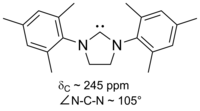
Photo from wikipedia
The synthesis of ruthenium carbene complex PhSO2(Ph2PNSiMe3)C═Ru(p-cymene) (3) and its application in cooperative bond activation reactions were studied. Compound 3 is accessible via salt metathesis using the dilithium methandiide ligand… Click to show full abstract
The synthesis of ruthenium carbene complex PhSO2(Ph2PNSiMe3)C═Ru(p-cymene) (3) and its application in cooperative bond activation reactions were studied. Compound 3 is accessible via salt metathesis using the dilithium methandiide ligand or alternatively via dehydrohalogenation of the corresponding chlorido complex 2. The carbene complex was studied by X-ray crystallography, multielement NMR spectroscopy, and DFT studies, all of which confirm the presence of a Ru═C double bond. The polarization of the Ru═C bond is less pronounced than in an analogous carbene complex with a thiophosphoryl instead of the iminophosphoryl moiety. This should be beneficial for realizing reversible activation processes by the addition of element-hydrogen bonds across the Ru═C double bond. Accordingly, 3 is more stable and the Ru═C linkage less reactive in the activation of aromatic alcohols and elemental dihydrogen, showing reversible processes and longer reaction times. Despite the selective addition of dihydrogen across the R...
Journal Title: Organometallics
Year Published: 2018
Link to full text (if available)
Share on Social Media: Sign Up to like & get
recommendations!